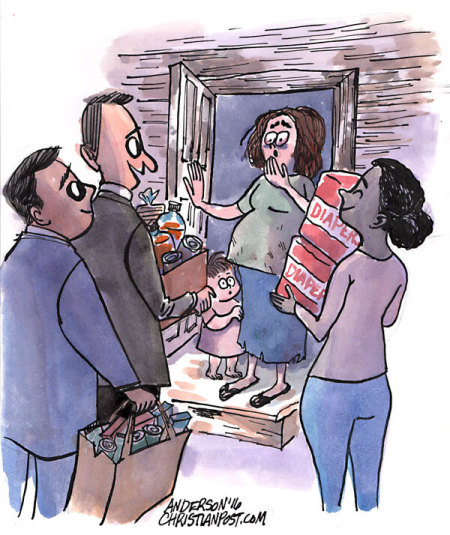A Democrat's Plea for Reason on Abortion After Hillary Wins

Editor's Note: For a response to Eric Sapp, see Ryan Bomberger's "A Republican's Plea for Reality on Abortion if Hillary Wins."
A few weeks ago, I wrote an op-ed for CP on why Democrats are a better choice for Pro-Life voters. I argued that Christians shouldn't be single issue voters, but for those who feel compelled to vote only on abortion, I encouraged them to look past the labels and rhetoric to consider which party actually did more to save the unborn.

The article struck a chord. It was read by over a million people, shared by hundreds of thousands, and even written about in numerous other publications. Not everyone agreed with me, but the predominantly positive and civil tone of the response — on social media — was extremely heartening.
So I would like to propose something that might be a bit radical. Having observed countless conversations by strangers about my piece, it seems Americans might actually be ready for a better and more honest conversation about abortion.
First, let's start with common ground that can be easily missed in the rhetoric of the extremes. Whether you identify as "pro-life" or "pro-choice," most Americans will agree that the fact that 1-in-5 pregnancies in America end in abortion highlights serious societal problems that need to be addressed. And since over 95% of abortions are the result of unwanted pregnancies, we should also be able to agree that abortion is a tragic symptom of a much bigger problem.
The question for "pro-life" Christians in the now near-certain upcoming Clinton presidency is: do we want to tackle the problem or continue the dead-end fight over the symptoms? Because, if we're going to solve the problem, we won't do so by focusing only on the symptoms or refusing to work together. It's like arguing over what the best treatment is for lung cancer instead of trying to reduce smoking.
Rhetoric and labels will at best accomplish only minimal movement around the margins. So we have to be honest about and tackle the factors that lead women to choose abortion. That won't be easy. It's much easier to simply yell, "Defund Planned Parenthood!" than wrestle with what the actual impact on abortions would be if we removed one of the largest (and in many regions, only) providers of contraception to poor women who are about 10 times more likely to have an abortion if they experience an unwanted pregnancy.
This is a good point to address a few of the objections raised by others to my conclusions that Democrats have been better about saving the unborn than Republicans. Most of those who disagreed primarily argued that rhetoric and party platforms matter more than outcomes.
Richard Land did try to tackle outcomes though, conceding that "it is true that abortion numbers go up in Republican presidential terms" but arguing that wasn't a fair measure since fertility also went up under Republicans. But since abortions are almost entirely the result of unwanted pregnancies, you'd expect more pregnancies (and births too since only about half of unwanted pregnancies are aborted) when you have more abortions.
Other writers said we should ignore abortion numbers and look only at the rate of abortions per thousand women. But those rates mostly reflect population growth and the trends toward later childbearing over the last 30 years. The point isn't whether there are more women in America but how many women who get pregnant are having abortions.
I originally focused on the number of abortions to keep it simple, but the trends are even stronger for Democrats if we look at rates of pregnant women who get abortions. Again, Land's own stats provide the proof that policy — rather than demographics — account for the differences. Land pointed out that there were years where various demographic factors resulted in spikes in pregnancy numbers under Democrats that equaled those more regularly seen under Republicans.
Yet when 4 million women got pregnant in the second year of Obama's tenure, there were HALF as many abortions as when that many women got pregnant under the second year of George H.W. Bush's term and nearly 15% fewer than the second year of George W. Bush's first term!
The reason so many fewer pregnant women terminate their pregnancy under Democrats — even when the number of pregnant women is the same — is because so many more women getting pregnant under Democratic policies are doing so intentionally or feel they had enough options to keep an unintended pregnancy.
And quickly on the Supreme Court, if it wouldn't overturn Roe when 2/3 of the Justices were appointed by "pro-life" GOP Presidents, it definitely won't moving forward when it is made up of majority Democratically-appointed justices. Some may wish things were different, but that will be the reality. And so again we have to ask, is our time and energy better spent on fighting old lost battles or seeking reconciliation and common ground that will move things forward on abortion?
I believe we're ready to start looking for solutions. Both parties can bring things of value to this discussion, and Lord knows we're going to have to work together to make any progress. But to do so, we need to tone down and be honest in our rhetoric.
Yet rhetoric — whether toxic or more reasonable — is still just talk. If we want to make real progress on abortion, we're going to need to tackle the root causes. That means working together on real solutions to combat unintended pregnancy and conditions of poverty that both fuel unwanted pregnancies and leave pregnant mothers with so few options and little support to raise their kids.
So I'll close by looking at what we can all do to tackle the underlying problem. When Republicans cut food stamps for hungry kids, Medicaid, or childcare support programs, Republican Christians often rationalize those actions by saying Christ's command was for Christians, not the state, to care for the poor and that the Church could do it better.
I agree. If Christians actually answered Christ's call, we could do it better. In fact, if only weekly-church attending Christians tithed, we'd have more new money to spend on helping the least of these than the entire U.S. domestic discretionary budget. It's not a question of if we could, it's a reality that we ARE NOT doing it better.
We wouldn't need housing vouchers if we built enough Habitat Homes or food stamps if we had enough food kitchens. Fewer poor mothers would feel they had no options but abortion if we did more for them than just write a check for the Angel Tree at Christmas.
Don't get me wrong. What the Church does is incredible and life-changing, and the fact that the poorest states in the South have the highest giving rates is inspirational. These problems aren't easy. It's hard to give and do more.
But I don't see how a faithful reading of Scripture can be to respond to the suffering of our neighbors, the lack of options for mothers, and the hunger of little children by focusing our political will on cutting the programs that help lift them up and fills the gap left when Christians fail to fully answer Christ's call. (And since charitable donations are 100% tax deductible, the excuse that if we'd answer Christ's call if we just had lower taxes is indefensible.)
So when the American people choose Hillary Clinton as our next president next week, our country — and especially Christians — will have a choice. Will we continue to accept a politics of despair and fear, defining ourselves more by who we are not than what we are willing to do together? Or will we extend a hand, even to our political "enemies," and try to move past the rhetoric and recriminations to find real solutions?
My career has exposed me to the worst of politics but also to the best of Americans on all sides. Hillary was right when she said America is great because [and when] America is good. Christians have a key role to play in calling upon the better angels of our nature. And so while it might seem like foolishness to the world, I have faith that Christians can heal our divides and that we are ready for a better conversation around abortion — and so many other things that matter to America.






















